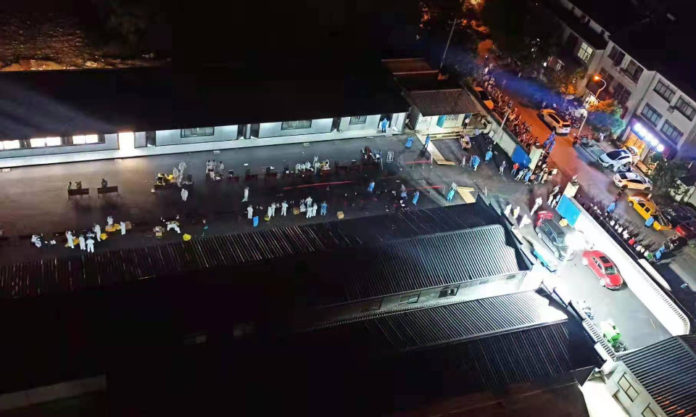What’s it like to live near the airport in Nanjing these days? “Frustrating” and “anxiety inducing” were the words used by one to whom The Nanjinger has talked. But now Lukou people are rallying together, albeit after a bit of a bumpy start.
But first, today’s numbers. Nanjing had a further 5 positive cases confirmed this morning, reports The Paper. That’s the smallest increase since the outbreak began, taking the total to 220.
Yesterday, The Nanjinger talked extensively with a resident of one of the communities near Nanjing Lukou International Airport under complete lockdown. Preferring to remain anonymous, she lives in the Haitang Yuan (海棠苑) community, which is just 4 kilometres from the airport. Her comments to The Nanjinger appear in italics as quotes, below.
This compound in Lukou Subdistrict is where many airline cleaning crews are based. As such, it and the two neighbouring compounds that together comprise Qincun Community (秦村社区) were the first in Nanjing to be closed.
Residents therein have had five NATs so far, but lucky them, for the past three tests, the doctors and nurses have come right to their doors to do it. No more standing sweating in the sun for locked-down Lukou.
“We had eight confirmed cases, or seven. I’m not sure. I stopped counting. It was pretty hard to keep track. And it got depressing.”
No doubt, but in the beginning, many local people were not taking the outbreak seriously. Just as has been the experience across much of Nanjing, the first NATs were chaotic. Even in the hotspot of Lukou, social distancing was at a minimum, as was the use of face masks.
In addition, quite a number of people in the community actually commute to near Baijia Lake, regarded by many as downtown Jiangning, home to 1912 and malls such as Kingmo, serious spots of potential transmission. Many were were still trying to go to work as the lockdown took hold and had got there to only be turned away at the parking lot by security staff.
With case numbers across Lukou piling up, a “modus operandi” needed to be established. And it goes thus. Upon a positive case being discovered in any unit (单元) in a residential community, everyone from the unit is to be evacuated for quarantine. This can easily be 150-200 people.
At first, vacant nearby tourism resort hotels were utilised. When space ran out, the dormitories in technical colleges, on holiday for the summer, were pressed into use.
If that’s sounds like overkill, let’s not underestimate the severity of the situation. After all, we are talking about China’s biggest COVID hotspot since Wuhan.
“It’s actually been a bit of a struggle. I didn’t think we were going to get shut down and so I didn’t over buy. … I didn’t want to be the toilet-paper hogger. And then they shut us down without warning and shut all the gates.”
In such circumstances, however, confusion is to be expected. And a standardised, uniform service, is perhaps a little too much to wish for.
“The government gave us some greens and stuff and they said they were going to do that every 3 days. Today is the 5th day; I don’t think they are going to drop anything off.
“There’s a lot going on and it’s totally understandable. But what’s anxiety inducing is that we have young children. They basically said ‘essentials only’, unless they are on milk powder and stuff like that. It’s just kind of hard to explain things to them because they don’t understand.”
At most compounds in Chinese cities, each unit has a “building representative” (楼长), employed by the community management to interface with residents. They do everything from mediating in disputes to answering simple questions.
And coping with lockdown situations.
“If you had a really nice one, they would offer to go and buy groceries and get them to you. I understand it’s a state of emergency but they said we were not allowed anything but essentials. Which is like diapers and salt. Not sugar, not vinegar.”
But as with the social distancing when lining up for NATs, residents’ complaints started to get heard. “Essentials” was soon expanded to include sugar, salt, vinegar, soy sauce and of course, toilet paper. Later on, eggs got a look in too.
“[It all] makes me think the state of emergency is dependent upon whoever you get assigned. So that’s been kind of the frustrating bit.”
The rest of Nanjing stands with you, Lukou, as the illuminated exteriors of the tallest of buildings downtown testify. But they’re not saying, “南京加油!” (Come on, Nanjing!), at least not yet.









